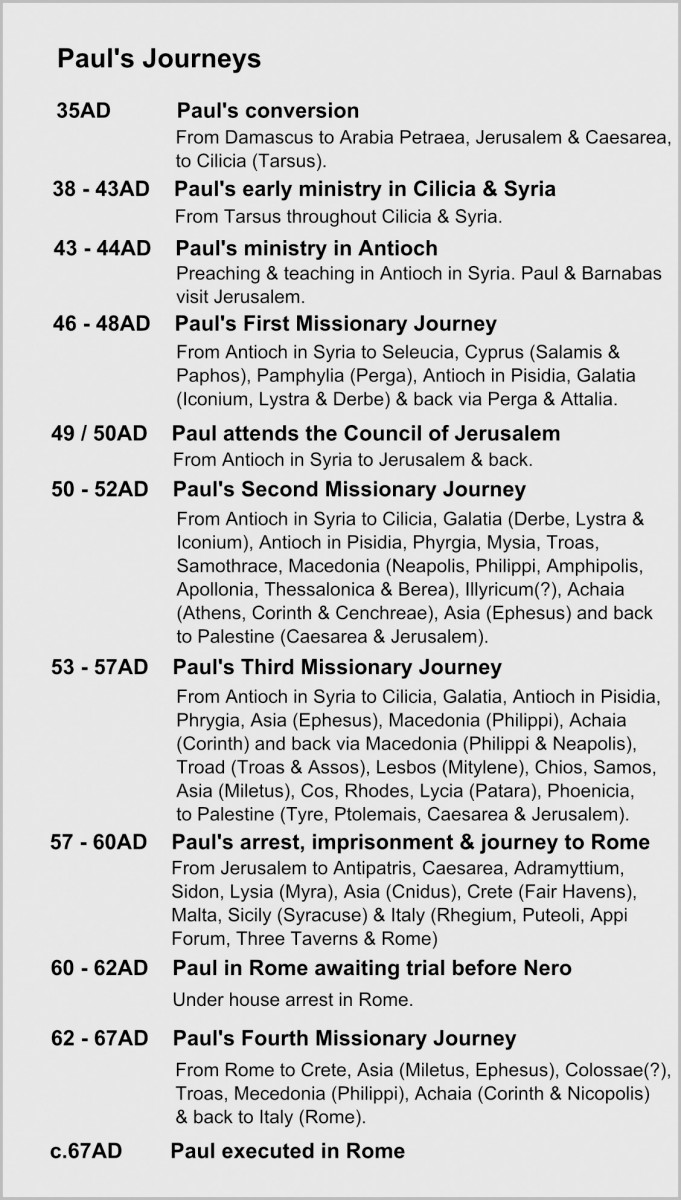27 May. Saul (Paul) spreads the Good News in Damascus and Tarsus
"Brothers and sisters, I want you to know that the Good News I preached to you was not made up by human beings. I did not get it from humans, nor did anyone teach it to me, but Jesus [the] Christ showed it to me."
"You have heard about my past life in the Jewish religion. I attacked the church of God and tried to destroy it. I was becoming a leader in the Jewish religion, doing better than most other Jews of my age. [Paul was aged c.30 in 35AD.] I tried harder than anyone else to follow the teachings handed down by our ancestors."
"But God had special plans for me and set me apart for his work even before I was born. He called me through his grace and showed his son to me so that I might tell the Good News about him to those who are not Jewish. When God called me, I did not get advice or help from any person. I did not go to Jerusalem [in 35AD] to see those who were apostles before I was."
"But without waiting I went away to Arabia and later went back to Damascus. After three years I went to Jerusalem [in 38AD] to meet Peter and stayed with him for fourteen days. I met no other apostles, except James, the brother of the Lord."
"God knows that these things I write are not lies. Later, I went to the areas of Syria and Cilicia... After fourteen years [from my conversion in 35AD] I went to Jerusalem again [in 49/50AD], this time with Barnabas. I also took Titus with me. I went because God showed me I should go. I met the believers there, and in private I told their leaders the Good News that I preach to the non-Jewish people."
(Paul's Letter to the Galatians 1:11 - 2:2)

Many Christians think that Paul first became a travelling preacher when he set out on his missionary journey to Cyprus, Pamphylia, Pisidia and Galatia in 46AD. However, Paul had eleven years of preaching experience in Damascus, Tarsus, Cilicia, and Syria before embarking on his "First Missionary Journey".
In his letter to the Christians in Galatia, written after he attended the Council of Jerusalem in 50AD,Paul told his readers about his missionary activities immediately after his encounter with the risen Lord Jesus on the road to Damascus in 35AD, five years after Jesus' death and resurrection.
Several days after his meeting with Ananias, when he was filled to overflowing with the power of the Holy Spirit, Paul journeyed into the neighbouring desert area of Arabia Petraea – probably to seek God quietly in prayer about his future. He then returned to Damascus where he preached the Good News to the Jewish community for three years.
After three years of preaching and teaching in Damascus (35-38AD), Saul was forced to flee for his life over the city wall at night in a basket (see Acts 9:23-25).
Saul went to Jerusalem to meet the leaders of the Christian community in 38AD, but the apostles were still afraid of his previous reputation and didn’t believe he could really be a Spirit-filled disciple (see Acts 9:26-29).
Barnabas – a Levite from Cyprus who assisted at the Temple in Jerusalem (see Acts 4:36) – introduced Saul to Peter and James (the brother of Jesus), who were the leaders of the Hebrew–speaking Jewish Christian community in Jerusalem (see Galatians 1:18-19).
Saul, from the Roman city of Tarsus in Cilicia, spoke fluent Greek – the everyday language of the eastern Mediterranean world - so he debated the death and resurrection of Jesus with the foreign Greek-speaking Jews in Jerusalem. But they tried to kill him for what they thought was 'blasphemy'.
After fifteen days in Jerusalem in 38AD, the disciples took Saul down to the port of Caesarea and sent him home to Tarsus in Cilicia by ship (see Acts 9:30). Saul spent the next five years (38 - 43AD) based at his home town of Tarsus, extending his preaching ministry to the Greek-speaking Jews in Cilicia and Syria (see Galatians 1:21).
In 43AD, Barnabas took Saul from Tarsus to Antioch in Syria (see Acts 11:25-26 ). For a whole year they preached and taught in Antioch. During this time (in 43/44AD), Barnabas and Saul visited the Jewish believers in Jerusalem with money for famine relief sent by their fellow believers in Antioch (see Acts 11:27-30).
It was only after a further three years preaching in Antioch that Saul set out on his "first missionary journey" in 46AD.
The table shows a time chart of Paul's missionary journeys from his conversion in 35AD to his death in c.67AD.
You can discover more about Damascus and Arabia Petraea @ https://www.thebiblejourney.org/…/saul-persecutes-the-beli…/
